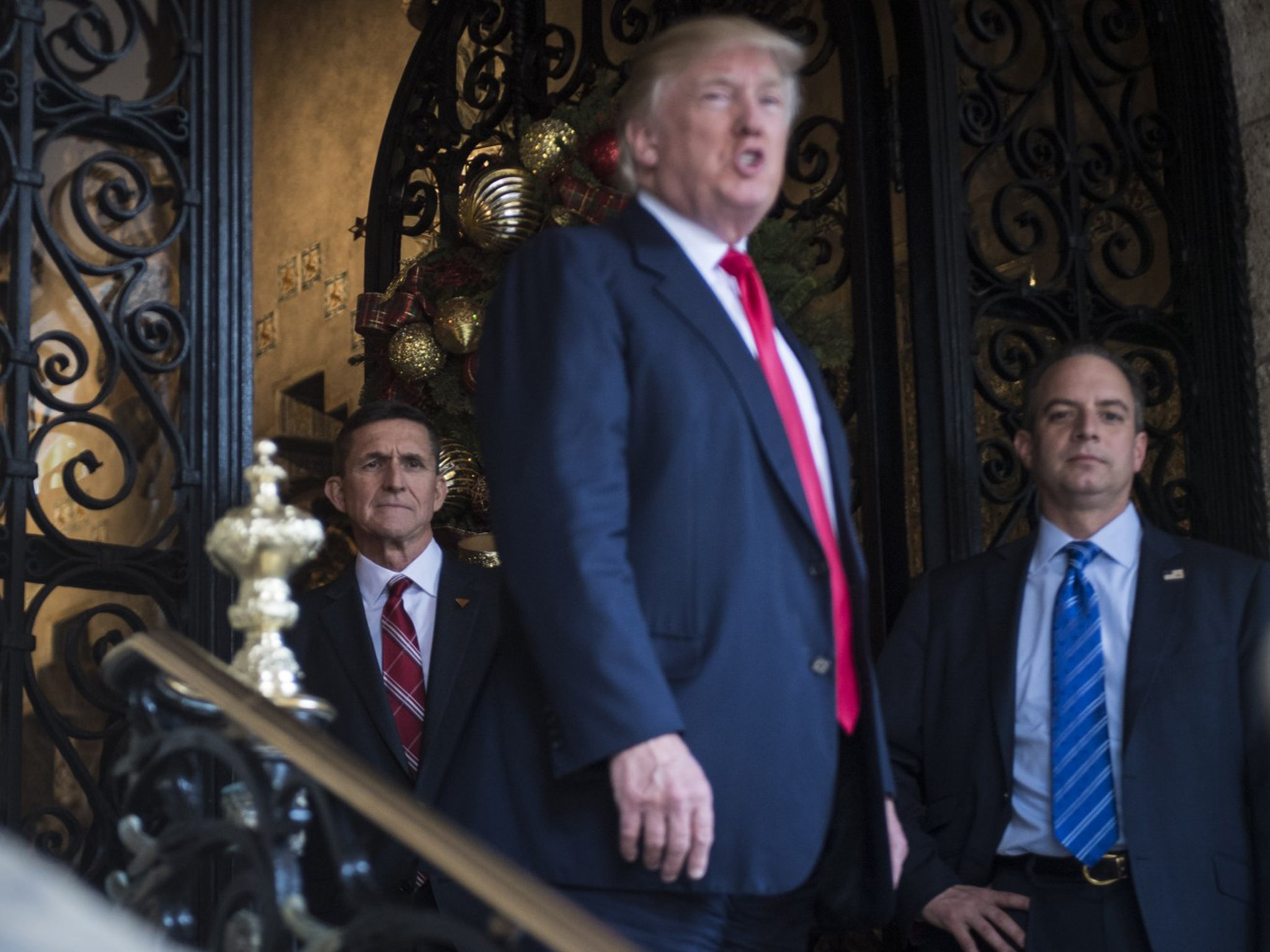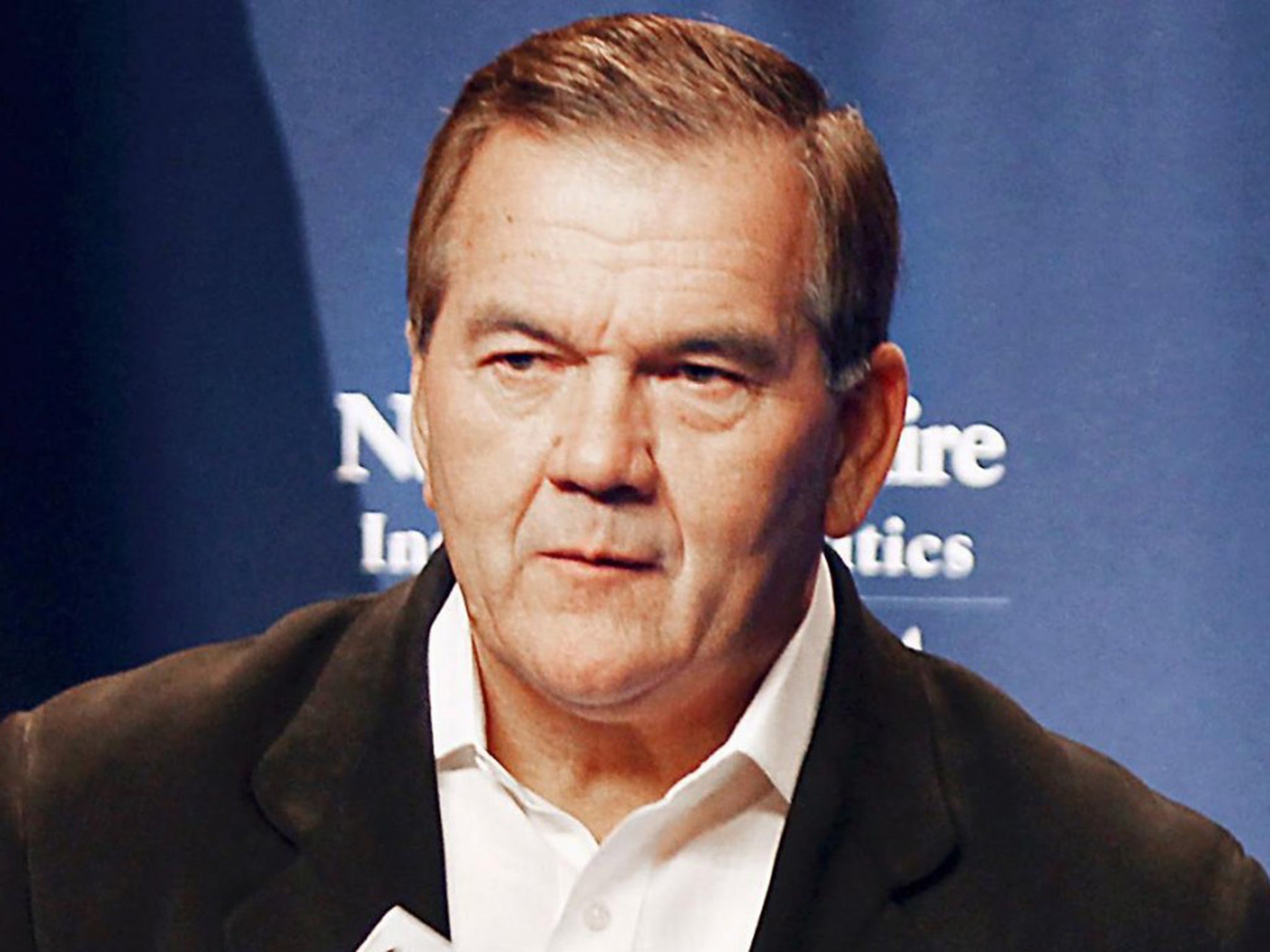‘Never Trump’ national security Republicans fear they have been blacklisted
Rebels anticipating repercussions after signing public letters denouncing candidate before election

Your support helps us to tell the story
From reproductive rights to climate change to Big Tech, The Independent is on the ground when the story is developing. Whether it's investigating the financials of Elon Musk's pro-Trump PAC or producing our latest documentary, 'The A Word', which shines a light on the American women fighting for reproductive rights, we know how important it is to parse out the facts from the messaging.
At such a critical moment in US history, we need reporters on the ground. Your donation allows us to keep sending journalists to speak to both sides of the story.
The Independent is trusted by Americans across the entire political spectrum. And unlike many other quality news outlets, we choose not to lock Americans out of our reporting and analysis with paywalls. We believe quality journalism should be available to everyone, paid for by those who can afford it.
Your support makes all the difference.They are some of the biggest names in the Republican national security firmament, veterans of past GOP administrations who say, if called upon by President-elect Donald Trump, they stand ready to serve their country again.
But their phones aren’t ringing. Their entreaties to Trump Tower in New York have mostly gone unanswered. In Trump world, these establishment all-stars say they are “PNG” - personae non gratae.
Their transgression was signing one or both of two public “Never Trump” letters during the campaign, declaring they would not vote for Trump and calling his candidacy a danger to the nation.
One letter, with 122 names, was published by War on the Rocks, a website devoted to national security commentary, during the primary season in March. The other, with 50 names, including some repeat signatories, was published by the New York Times during the general-election campaign in August.
Now, just days before Trump is sworn in as the nation’s 45th president, the letter signers fear they have been added to another document, this one private - a purported blacklist compiled by Trump’s political advisers.

“Before he won, the conversation was, ‘We really would love for you to change your mind and join us,’” Peter Feaver, a National Security Council special adviser under President George W. Bush, said of informal talks with Trump aides. Feaver, who signed both letters, added that, “Since he won... the conversation is, ‘There likely will be a blacklist of people who signed the letters who won’t themselves be eligible for a post.’”
Trump transition aides did not respond to a request for comment for this article.
The President-elect has virtually no experience in national security and foreign policy, and his transition team could presumably benefit from the broadest pool of applicants for the influential appointive positions in the State Department, Pentagon and Department of Homeland Security.
But the purportedly blacklisted figures report to their jobs at Washington law firms and think tanks in a state of indefinite limbo as their colleagues, some working in the same offices, are flirting with potential administration jobs.
Last week, the Trump transition held a private briefing for Secretary of State nominee Rex Tillerson to prepare him for his Senate confirmation hearing. One former Bush national security official who works at a Washington think tank said that some of his younger staff assistants were invited to participate but that he was not. He assumes it was because he signed the letter.
“It’s hostile,” said this person, who spoke on the condition of anonymity for fear of further retribution. “It’s not just that we’re frozen out... I was told they said there was an enemies list.”
Among those who signed at least one of the letters are Tom Ridge and Michael Chertoff, the first two secretaries of the Department of Homeland Security; two former US trade ambassadors, Carla Hills and Robert Zoellick; two former heads of US intelligence agencies, John Negroponte and retired Air Force Gen. Michael V. Hayden; a former ambassador to NATO; and several former deputy secretaries of various US government agencies.
Not everyone who signed the letters wants a job, and some remain vocal critics of Trump. But many stand ready to serve or offer guidance if asked.
The letters were explicit in their denunciations of Trump’s professed support for torture of terrorism suspects, his pledge to build a wall along the border with Mexico, his anti-Muslim rhetoric and his admiration for Russian President Vladimir Putin.
The letters also attacked Trump’s character and temperament, asserting that he “lacks self-control and acts impetuously,” has demonstrated “erratic behavior” and is “fundamentally dishonest.”
Former Bush administration lawyer John Bellinger III, who organised the letter published in the Times, said that many have not given up and are trying to help from the outside.
“They’re seeing how it goes and trying to provide advice, counsel, support to our friends who go into the administration,” said Bellinger, who has served as legal counsel at the State Department and the National Security Council.
The scenario was set up by Trump’s unorthodox candidacy and then his upset victory. The threat the New York business mogul’s populist campaign posed to the establishment of his party caused some of the Republicans’ leading lights to oppose him, even after he had clinched the nomination.
The question after Election Day was how quickly Trump loyalists and the onetime GOP resistance would reconcile.
In some cases, the process has gone fairly smoothly. Congressional leaders who had been lukewarm toward Trump’s campaign have made nice with the president-elect, and they have vowed to work together on a conservative policy agenda.
In other cases, it has been painfully awkward, as with Trump’s flirtation with Mitt Romney for Secretary of State. Romney had called Trump a “phony” and a “fraud” last March, but the 2012 GOP presidential nominee called to congratulate Trump on his election victory. After a courtship that included a dinner of frog legs and lamb chops in New York, Romney was passed over for Tillerson, the head of ExxonMobil.
During a national security forum last week at the US Institute of Peace in Washington, K.T. McFarland, who was named Trump’s deputy national security adviser, opened her remarks by referring to the “elephant in the room.”
“Most of the people in this room didn’t support Donald Trump - maybe not at first or maybe ever,” she said. “And I suspect most of the people in this room didn’t think he’d win. But he has.”
Some of the “Never Trump” letters signers fear they are at the bottom of the pecking order, below those who expressed verbal opposition to Trump’s campaign but did not sign either of the letters.
The conflict was exacerbated shortly after the election when Eliot Cohen, a State Department counsellor during the Bush administration who had helped organise the War on the Rocks letter, aired new criticism of the Trump transition. In an opinion column for The Washington Post in November, Cohen said that a friend on the transition team had asked him to provide names of potential job candidates - with the stipulation that he include no one who signed either of the letters.
Cohen wrote that he became convinced there were “pent-up resentments” among members of the Trump team, and he warned young policy experts against working for the administration. Cohen has had no further communications with the transition team.
“Believe me - my phone is not ringing,” he said in a recent interview.
Other letter signers said Cohen had misinterpreted emails from the transition official and overreacted, and some of them expressed a sense of regret.
Mary Beth Long, who served as assistant secretary of defence in the Bush administration, signed the War on the Rocks letter. But, she said, her opinion of Trump improved as he began to moderate his rhetoric and selected Indiana Gov. Mike Pence as his running mate.
Long attended a Pence rally in Charlotte in October, during which, she said, a local GOP official announced that a “Never Trump” letter signer in the audience had changed her mind and was now supporting Trump. The crowd cheered.
But her about-face hasn’t thawed the ice. Long said her inquiries to the Trump transition team to get clarity on some of his foreign policy positions have gone unanswered. She said that she has spoken with retired Army Lt. Gen. Michael T. Flynn, Trump’s designee for national security adviser, whom she knows from the Pentagon, but that she isn’t expecting a job.
“If I were asked to sign a letter like that again, I would be much more careful about the verbiage that related to the candidate himself,” she said.
Some letter signers said the Trump transition might be overwhelmed and could reach out more broadly in the coming weeks. Some hoped that Cabinet nominees, such as retired Marine Gen. James N. Mattis, Trump’s pick to head the Pentagon, could potentially have the freedom to hire them. Many jobs below the Cabinet level remain unfilled.
But others are resigned to waiting until some of Trump’s initial appointees begin leaving his administration.
Frances Townsend, a former Bush homeland security adviser who signed the War on the Rocks letter, is friendly with Flynn. A few weeks after the election, she received an email from the transition team inviting her to meet with the president-elect.
Ahead of the meeting, she thought over how to explain her past actions if Trump raised the letter - but he did not, she said.
But others are resigned to waiting until some of Trump’s initial appointees begin leaving his administration.
Frances Townsend, a former Bush homeland security adviser who signed the War on the Rocks letter, is friendly with Flynn. A few weeks after the election, she received an email from the transition team inviting her to meet with the president-elect.
Ahead of the meeting, she thought over how to explain her past actions if Trump raised the letter - but he did not, she said.
“I took that as a sign of maturity and graciousness,” said Townsend, who has not taken a job with the administration and declined to say whether she was offered one.
“As I was leaving, I said I was privileged and humbled to come in and speak to him,” she said. “It was a veiled reference [to the letter]. Given the circumstances, I didn’t expect to be there.”
The Washington Post
Join our commenting forum
Join thought-provoking conversations, follow other Independent readers and see their replies
Comments